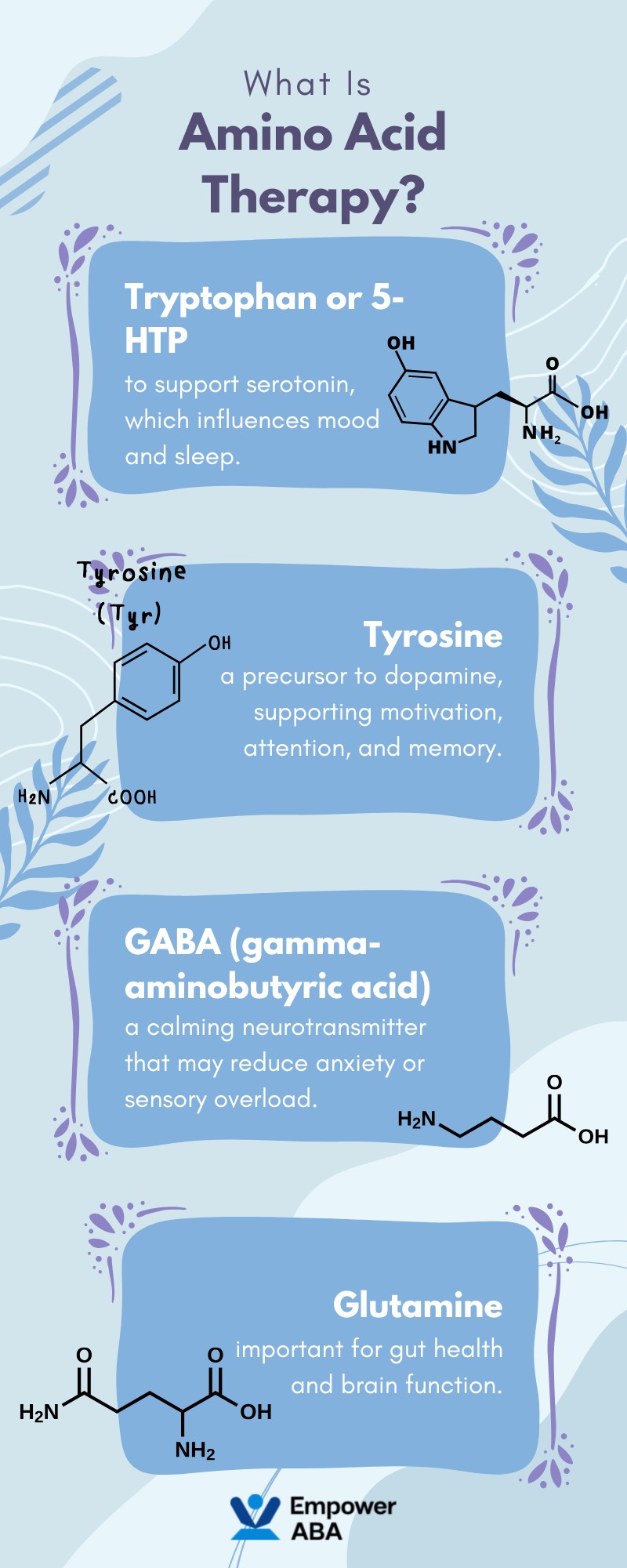Key Points:
- Amino acid therapy may support autism treatment by helping regulate mood, behavior, and neurological function.
- Each child is different, and results depend on individual needs and professional guidance.
- This approach is not a standalone cure, but it can complement other therapies, including ABA therapy.
When a child is diagnosed with autism, many parents begin a journey of research and discovery, seeking ways to best support their child’s growth, communication, and daily life. For families exploring nutritional and biomedical supports, one area that often comes up is amino acid therapy autism strategies. While not a magic bullet, this approach has sparked growing interest in how it may influence mood, focus, and overall development.
Can Amino Acids Help with Autism Symptoms?
Yes, in some cases, amino acid therapy may help regulate behavior and support brain function. It’s not a cure, but it may offer benefits when tailored to a child’s unique needs.
Amino acids are the building blocks of protein and play essential roles in the body. They are especially important in brain development and neurotransmitter function—basically, the chemicals that allow brain cells to talk to each other. Some studies and practitioners suggest that children on the autism spectrum may have imbalances or deficiencies in certain amino acids, which could contribute to mood swings, anxiety, or challenges with focus.
What is Amino Acid Therapy?
Amino acid therapy involves supplementing specific amino acids to help improve neurotransmitter function, support metabolism, and promote emotional regulation.
In the context of autism, this therapy typically focuses on correcting potential imbalances by introducing targeted amino acid supplements. These may include:

Each supplement targets a specific neurotransmitter or body function. But it’s crucial that any use of amino acid therapy autism strategies is guided by medical professionals. Unbalanced supplementation can sometimes do more harm than good, particularly in young, developing children.
Why Might Children with Autism Benefit?
Let’s explore the potential reasons amino acid therapy might help support children on the spectrum, based on emerging research and clinical experiences.
Children with autism may have:
- Disrupted neurotransmitter production, affecting communication between brain cells.
- Digestive issues that interfere with nutrient absorption, including amino acids.
- Increased oxidative stress, which amino acids can sometimes help mitigate.
- Dietary limitations that result in lower levels of essential amino acids.
By improving the body’s ability to produce the right chemicals at the right levels, amino acid therapy may help children feel more balanced and better able to engage in learning, relationships, and daily tasks—a concept that connects closely with exploring how digestive support impacts overall well-being. To dive deeper into this connection, check out our article Are Digestive Enzymes Key to Healing the Autistic Gut?
4 Signs That Amino Acid Support Might Be Needed
Wondering if this therapy might be worth exploring for your child? Here are a few signs that could prompt a conversation with a healthcare provider.
Some parents and professionals report positive results when children exhibit:
- Sudden mood swings or emotional dysregulation.
- High anxiety or difficulty sleeping.
- Severe picky eating that limits protein or essential nutrient intake.
- Challenges with attention, focus, or executive functioning.
It’s important to note that these signs are not exclusive to amino acid imbalance and could stem from many different sources. Professional testing, such as urine or blood analysis, may help determine specific deficiencies.

Tips for Parents Exploring Amino Acid Therapy Autism Support
If you’re curious about trying this route, here are some practical steps to follow:
1. Work with a Specialist
Seek a healthcare provider familiar with autism and biochemical testing. Functional medicine doctors, integrative pediatricians, or certain nutritionists may have the tools to guide you safely.
2. Request Lab Testing
Don’t guess. Many amino acids interact with each other, and too much of one can suppress another. A professional can recommend the right testing, such as organic acid tests or amino acid panels.
3. Start Low, Go Slow
Even when recommended by a doctor, start with small doses and observe. Children with autism can be highly sensitive to supplements.
4. Track Changes
Keep a daily log of sleep, behavior, energy levels, and digestion. This helps you and your care team determine what’s helping and what needs adjusting.
5. Be Patient
Improvements can take time. Some children may show changes in a week, while others need months of fine-tuning.
How Does This Fit with Other Autism Therapies?
Amino acid therapy is not meant to replace other therapies like speech, occupational therapy, or behavioral interventions. Instead, it may complement these approaches by helping the brain and body function at their best.
For example, when paired with Applied Behavior Analysis (ABA), amino acid therapy may help a child become more receptive to learning, more emotionally regulated, or more capable of following routines. It’s one piece of a much larger puzzle.
What are the Risks?
No therapy is completely risk-free, and amino acid therapy is no exception. Here are a few things to watch out for:
- Over-supplementation can lead to headaches, irritability, or nausea.
- Unsupervised use may interfere with other medications or medical conditions.
- False expectations can lead to disappointment; not every child responds the same way.
That’s why it’s so important to work with a knowledgeable provider who can tailor the approach to your child’s individual profile.
When to Consider ABA Therapy
As parents explore biological supports like amino acid therapy, it’s also critical to have a strong foundation in behavioral support. That’s where ABA therapy comes in.
ABA (Applied Behavior Analysis) is a proven method for teaching communication, social skills, and adaptive behavior to children with autism. It’s structured, evidence-based, and tailored to each child’s goals.
Partner With Empower ABA for Comprehensive Support
If you’re looking for trusted, compassionate care, Empower ABA is here to help. We offer ABA therapy in Virginia, New York, and New Jersey, providing families with customized plans that meet their child’s specific needs and learning style.
Whether you’re just starting your journey or looking to enhance current therapies, our experienced team works alongside families with empathy, skill, and dedication. While amino acid therapy autism approaches may support overall development, ABA remains the gold standard in helping children build essential life skills.
Contact us today to learn how our ABA services can support your child’s path to growth and independence.

